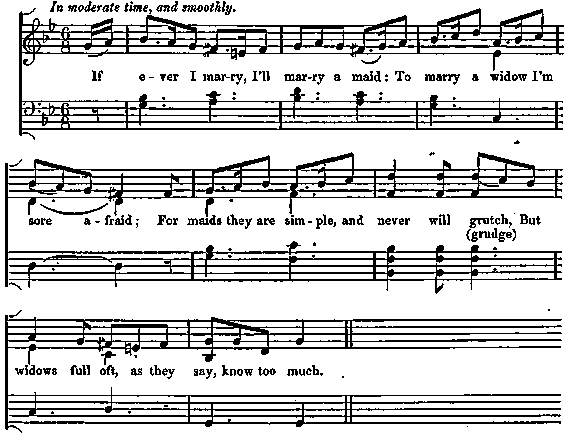Popular Music Of The Olden Time Vol 1
Ancient Songs, Ballads, & Dance Tunes, Sheet Music & Lyrics - online book
| Share page | Visit Us On FB |
|
96 |
ENGLISH SONG AND BALLAD MUSIC. |
||
|
the most popular in his day. He says, " Homer, with his music, cured the sick soldiers in the Grecians' camp, and purged every man's tent of the plague. Think you that those miracles could be wrought with playing dances, dumps, pavans, galliards, fancies, or new strains ? They never came where this grew,
nor knew what it meant.....Terpander neither piped Rogero, nor Turheloney,
when he ended the brabbles at Lacedemon, but, putting them in mind of Lycurgus' laws, taught them to tread a better measure:" but, "if you enquire how many such poets and pipers we have in our age, I am persuaded that every one of them may creep through a ring, or dance the wild morris in a needle's eye. We have infinite poets and pipers, and such peevish cattle among us in England, that live by merry begging, maintained by alms, and privily encroach upon every man's purse, but if they in authority should call an account to see how many Chirons, Terpandri, and Homers are here, they might cast the sum without pen or counters, and sit down with Eachel to weep for her children, because they are not."
Turheylony is also mentioned, as a dance tune, in Nashe's Save with you to Saffron-Walden, 1596; and the music will be found.in William Ballet's Lute Book, described in a note at page 86.
The words here coupled with the tune are taken from a manuscript in the possession of Mr. Payne Collier. Although the manuscript is of the reign of James I., the " ballett" Yf ever I marry, I will marry a mayde, was entered at Stationers' Hall as early as 1557-8. The name of the air to which it should be sung is neither given in the MS., nor in the entry at Stationers' Hall; but the words and music agree so well together, that it is very probable the ballet was written to this tune. |
|||
|
|
|||
 |
|||